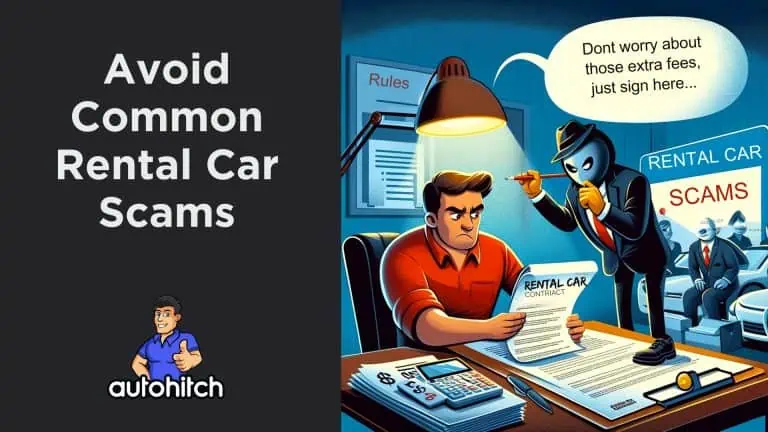Rental car scams have become increasingly common since the pandemic, preying on the urgent transportation needs of travelers.
As a former car dealer, I’ve seen various tricks used to extract extra money from unsuspecting customers.
Here’s what you need to know to lock in the best rental car deals and avoid scams.
Relevant Articles To Read:
Table of Contents
Most Prevalent Rental Car Scams
These are the key fraudulent schemes to watch out for currently:
- Fake rental companies create realistic looking websites, ads and numbers to lure customers. They insist on upfront prepayment then disappear once you pay by prepaid card. This causes many victims to lose hundreds of dollars without receiving any rental car service.
- Damage claims can happen when unscrupulous companies falsely accuse you of new dents or scratches, then overcharge for repairs.
- Insurance scams dupe customers into buying expensive redundant coverage policies.
- Car rental firms bury lots of outrageous fees and penalties in the fine print of lengthy contracts.
6 Red Flags Signaling a Rental Car Scam
Watch for these common markers that something shady is going on:
- Too good to be true pricing or discounts requiring prepayment
- Missing or incorrect contact information and addresses
- Insistence on prepaid cards rather than credit cards
- High-pressure tactics to get you to buy extras
- Vague fine print with exorbitant fees
- Outdated, damaged or dirty vehicles
8 Vital Tips to Avoid Rental Car Scams
Arm yourself with knowledge and take these precautions to ensure smooth travels:
1. Verify Deals Thoroughly
Always verify special promotions, discounts or pricing directly with the company by calling official customer service numbers listed on the business’s website. Avoid relying solely on website listings. Thoroughly research rental car companies online first before providing any personal information or payments.
2. Never Prepay with Risky Payment Methods
Never prepay for rental car reservations with prepaid gift cards or debit cards. Scammers often insist on these risky payment methods that offer zero fraud protection or recourse. Legitimate firms will accept secure credit card payments.
3. Confirm Existing Insurance Coverage
Contact your auto insurance provider and credit card company to confirm what exact rental car coverage you already have before booking. Then you can safely decline expensive redundant insurance policies at pick-up.
4. Inspect Vehicles Closely
Carefully inspect the exterior and interior of rental cars at pick-up and drop-off, taking dated, time-stamped photos and videos. This provides proof if companies later falsely claim damages.
5. Beware Upsell Offers
Politely decline any high-pressure sales tactics for added insurance, GPS rentals, refueling packages and other pricey extras at the counter. Confirm you have separate sufficient coverage first.
6. Read Rental Contracts Fully
Read car rental agreements in their entirety to avoid being blindsided by hidden fees or cancellation penalties buried deep in the fine print. Also have an agent note any unreasonable clauses.
7. Keep All Rental Documents
Hold onto rental car reservation confirmations, invoices, inspection reports and any other important documentation. This supports fighting back against any unfair charges that arise later.
8. Report Suspected Scams
Promptly report any experiences with potential fraudsters masquerading as rental agents or predatory firms overcharging for damages. File complaints with both the affected rental car company and regulators like the Federal Trade Commission.
Outsmarting Tricks and Getting Compensated
If you do encounter issues with a rental car company, here is how to outmaneuver their tactics and get recourse:
Disputing Bogus Damage Claims
Car rental firms often use pre-existing dents and scrapes to falsely claim repairs from customers. Fight this by showing visual evidence like dated pickup and dropoff photos or videos clearly displaying the vehicle condition. No new damage means no grounds to charge you extra unethically.
Refusing Redundant Insurance
Additional policies sold are usually unnecessary and overpriced. Be firm and decline paying if it duplicates existing coverage you already have. Note that it’s illegal for companies to deny renting you a car if you refuse extra insurance.
Contesting Hidden Charges
Get ahead by reading contracts fully first. Make sure check-in agents note if you see unreasonable clauses too. Report scam attempts to management immediately. Finally, if issues arise later, file detailed complaints to the firm and regulators like the FTC’s consumer rights section.
Recouping Losses
If you do lose money from a scam, contact your credit card provider to dispute the charges by showing you received no services.
For other payment methods, file official complaints to pressure the car rental company for refunds, including threats of public reviews and legal action. Reach out to local consumer affairs groups for guidance too.
Sources for this Article
- https://www.torquenews.com/14093/how-car-rental-companies-scam-people-out-money
- https://www.reddit.com/r/TravelHacks/comments/yaldt7/car_rental_companies/?rdt=54018
- https://siccura.com/car-rental-scams-how-to-avoid-them/
- https://consumer.ftc.gov/consumer-alerts/2021/06/hot-rental-car-market-scams
- https://www.nytimes.com/2021/06/18/your-money/fake-rental-car-sites.html



